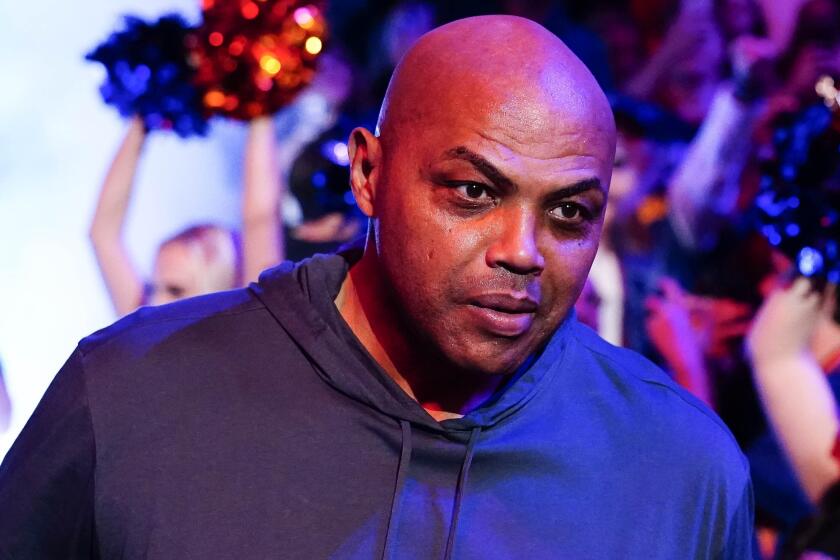‘LBJ’ Class Act on a History Double Bill
He was complex and driven, a squinting, flap-eared, ruthless, big-drinking, chain-smoking, giant ruffian of a Texan who could eyeball a fella into doing what he wanted him to do. But his dreams of a grand new society without poverty were incinerated in the flames of America’s ghettos and the napalm of Vietnam.
Here was a hothouse politician who courted greatness as aggressively as he did voters, only to wed himself to a military and political debacle that was to haunt him and drive him from office.
Here was a crude but charming country Democrat who made Populism the sinew of his body politic. Yet in the end, it was the people who abandoned him.
More than merely a man, Lyndon Baines Johnson was an event.
“He was just interesting as hell,” someone recalls in “LBJ,” a four-hour documentary that launches a new season for “The American Experience” tonight on PBS. (It airs in two parts, tonight and Tuesday, at 8 p.m. on KVCR Channel 24 and at 9 p.m. on KCET Channel 28 and KPBS Channel 15.)
Happy days are here again, for “LBJ” is historical filmmaking at its deepest and classiest, a full, warm-blooded, 10-gallon-sized portrait that captures the barbecue aroma of Texas politics, the shadowy wheeling and dealing of Washington and the rhythms and demons of the man who succeeded John F. Kennedy as President.
“LBJ” is joined on the contemporary history front tonight by a docudrama recalling the 14-month Iran hostage crisis that ended Jan. 20, 1981, the day Jimmy Carter relinquished the presidency to Ronald Reagan.
“Iran: Days of Crisis” also airs in two parts, opening on cable’s TNT network at 5 p.m. with repeats at 7 and 9 p.m., then returning Tuesday at those same times.
It’s likely that not even last season’s PBS behemoth “The Civil War” significantly altered the public perception that historical documentaries are necessarily eggheaded and dull, and that only through the oft-distorted lens of docudramas can events of the past become exciting and captivating on TV.
Check out tonight’s role reversal, however. Even embellished by dramatic license, frequent action and credible performances by actors portraying both real-life and fictional figures in an event of gripping horror, TNT’s docudrama is not nearly as consistently compelling or illuminating as the PBS documentary by talented David Grubin.
At the center of both “LBJ” and “Days of Crisis” are presidencies maimed by foreign tragedy. While the former is mesmerizing, however, the latter is only modestly distinguished and occasionally interesting.
The hostage saga--started when American embassy personnel were taken prisoner in Tehran following the Ayatollah Khomeini’s violent revolution that toppled the Shah’s repressive dictatorship--is depicted here from several perspectives: American diplomat and hostage John Limbert (Arliss Howard); Limbert’s Iranian wife, Parveneh (Alice Krige); Parveneh’s sister, Zaleh (Valerie Kaprisky), whose joining of the fundamentalist revolt alienates her Westernized family; and President Carter (George Grizzard) and his advisers.
The Shah’s notorious secret police, SAVAK, become a grisly metaphor here for the savagery and terrorism that typified the U.S.-backed Iranian regime, which nourished fundamentalist forces for radical change. The story also chronicles mixed signals and misjudgments on the part of the White House that damaged the U.S. cause in Iran.
That “Days of Crisis” is nonetheless somewhat kind to Carter--who is one-dimensionally pictured here as a fatherly, heart-of-gold, well-meaning, sweet old thing of a President--is hardly jolting, given that executive producer Gerald Rafshoon was a long-time Carter ally and his communications director in the White House.
Some of director Kevin Connor’s action sequences are electrifying. The embassy takeover by Iranian militants, with American personnel inside frantically destroying classified material as angry mobs invade the grounds, has you on the edge of your seat. And you feel the pain when the Americans are later bullied and brutalized by some of their captors.
Yet the White House sequences are wooden, the script zooms over the top in having Zaleh become a peripheral player in back-channel negotiations to end the crisis, and some of the casting is bizarre.
The components of tonight’s history double feature do share another theme--disappointment: Carter’s over his failure to free the hostages (the script does not explore recent charges that Reagan’s crowd got Iran to delay their release until he took office), and Johnson’s that the war in Vietnam torched much of what he had worked for and that even his landmark Civil Rights Act did not earn him universal respect from inner-city blacks and other minorities.
Wonderfully narrated by historian David McCullough, the “American Experience” host who was also the voice for “The Civil War,” “LBJ” kicks off with Johnson as an eager young candidate learning stuff-the-ballot politics in the muddy backwaters of Texas, ultimately becoming known as the grinch who stole the 1948 senatorial election. What begins as a rollicking country fiddlefest, however, years later will end as a sad waltz.
Some incredible White House photos and footage of Johnson’s 1964 inaugural ball make the point. Grubin and co-executive producer Patricia Perini slow down the latter, letting us see the smiles and optimism on the faces of the President and Vice President Hubert Humphrey as they glide across the dance floor with their wives in a sort of eerie ballet.
It takes on special poignancy in view of what is to follow. Less than four years later--the war in Vietnam that he accelerated and opposition to it now raging--Johnson will be out of office, having chosen not to seek re-election against a noisy barrage of opposition.
Replayed several times, the ball sequence is a defining moment in a story about a man depicted here as many men: a New Deal Democrat who turned reactionary when it served his purpose; a segregationist who later crusaded for integration yet continued in private to use the “N” word for blacks; a pragmatist and a visionary; a coarse, offensive boor whose powers of cajolery were legendary.
Few presidents have engendered such intense feelings, pro and con, and this above all is what emerges from this superlative profile.
“I liked him when I was with him,” says LBJ biographer Ronnie Dugger. “More than I did when I was thinking about him.”
The complete guide to home viewing
Get Screen Gab for everything about the TV shows and streaming movies everyone’s talking about.
You may occasionally receive promotional content from the Los Angeles Times.



